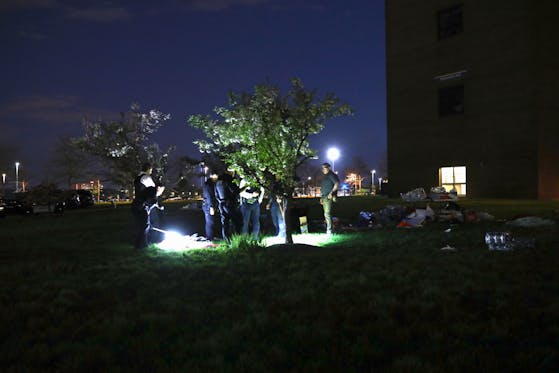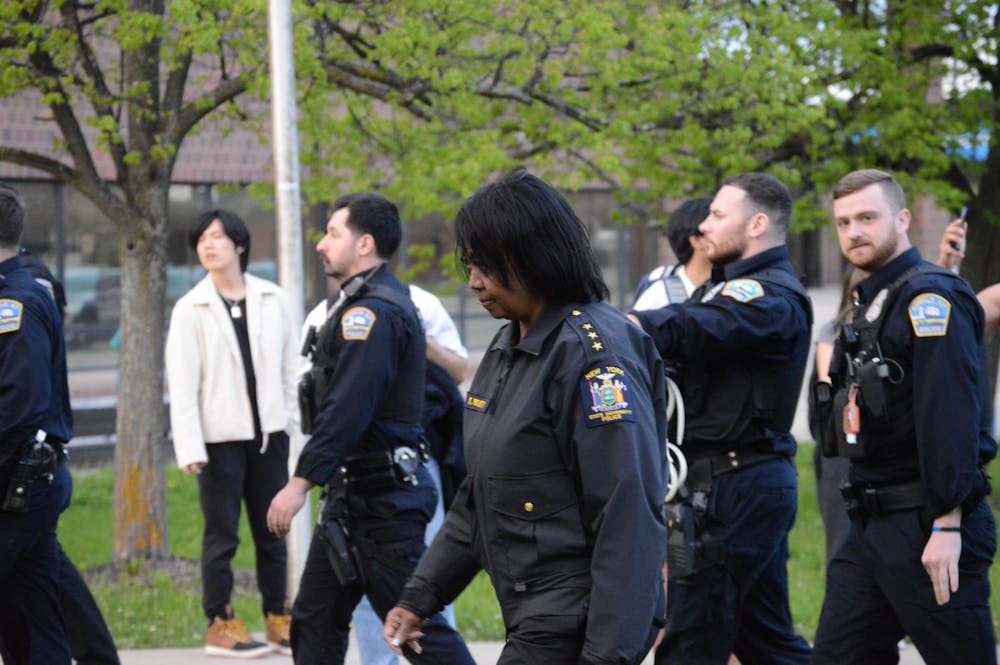The Faculty Senate passed a resolution Tuesday afternoon opposing the “severe police response” to a pro-Palestinian protest on campus May 1.
35 faculty members voted in favor of the resolution, 17 voted against and one abstained during the three-hour meeting, which was held using Zoom.
The resolution — based on a letter that’s been signed by over 300 faculty members — also calls for an investigation into “ad hoc, dangerous and discriminatory” enforcement of UB’s Picketing and Assembly Policy, and demands a public review of University Police (UPD) protocols, including its guidelines for requesting outside law enforcement.
The letter and the resolution come in response to the events of May 1, when pro-Palestine protesters attempted to form an encampment on UB’s North Campus. After police ordered the encampment taken down, demonstrators transitioned to a sit-in. Law enforcement ordered demonstrators to disperse by sundown, and at 8:22 p.m., police moved on the demonstration, arresting 15 protesters, including seven students.
Police officers were recorded tackling protesters, shoving a Spectrum reporter and allegedly ripping a woman’s hijab off. UPD charged those arrested with offenses including loitering, trespass, disorderly conduct and one instance of resisting arrest. The arrested students were not charged by UB with violations of the university’s Code of Conduct.
In order to pass the motion this Tuesday, the Faculty Senate voted 43 to 16 to suspend a rule requiring that it be read at two separate meetings.
Geography professor Sara Metcalf, who introduced the resolution, said it was important that it pass at Tuesday’s meeting, which is the last Faculty Senate meeting until Sept. 19.
“If it weren’t able to be approved before the fall, the timeliness and urgency would be lost,” Metcalf said.
UB President Satish Tripathi and Provost A. Scott Weber attended the meeting. Tripathi read a statement he previously delivered at last Tuesday’s Faculty Senate Executive Committee meeting, saying that UB “must ensure the safety and security of [the] entire university.”
Tripathi said that calling in outside law enforcement is “not something the university does lightly,” but that it is warranted when there is “a threat to campus safety and security.”
He said UB “received numerous reports” ahead of the protest “that large numbers of protesters from outside the university were coming to campus with intentions to disrupt campus operations.”
Neurology researcher Maureen Milligan objected to Tripathi’s reference to outsiders.
“The ‘outside agitator’ trope is the language of white supremacy,” Milligan wrote in the Zoom chat. “The Buffalo community has a big stake in what happens at UB as one of the biggest employers in the region. How dare you call community members outsiders?”
Professors advocating for the resolution’s passage said the police response to the May 1 protests was excessive and unusual.
Law professor Athena Mutua contrasted that day’s events with a protest last year against an on-campus speech by right-wing speaker Michael Knowles.
“I was at the Michael Knowles protest, and they were quite rowdy and quite glorious, I think, and that protest was not interrupted… They went on for quite a while, certainly past dusk,” Mutua said. “I wonder if we have some inconsistencies around who can be out overnight in some sort of gathering. But here specifically, these students were told that they had to disperse by sunset. And that is simply some particular interpretation of the rule — that is not overnight.”

Police searched the site of the May 1 pro-Palestine protest and attempted encampment after dispersing demonstrators. Belongings left behind were confiscated by University Police.
Nursing professor Meg Doerzbacher referenced a video from May 1 in which a police officer appears to rip a woman’s hijab off.
“I’m not sure people in the United States fully understand what it means to forcefully remove a woman’s head covering, who is Muslim,” Doerzbacher said. “In the Muslim culture, that would be like removing a woman’s shirt and bra so that her breasts were exposed.”
Several professors spoke against the motion.
Surgery professor Dr. Yaron Perry said that Jewish students have felt unsafe on campus since May 1, and that the information available is not sufficient to make an informed vote.
“We need to know all the data and facts before making this decision, because obviously, I don’t think that this demonstration was stopped for no reason whatsoever,” Perry said.
Engineering professor Kamran Nemati said police gave protesters “ample opportunity to disperse.” Timothy Georger, a media study Ph. D. student who was arrested at the protest and charged with loitering, rejected that notion.
“The organizers were constantly in communication with the police, who regularly shifted the goalposts,” Georger wrote in the Zoom meeting chat. “Police raided the protestors roughly 20-30 seconds after evening prayer concluded, and protestors who were visibly Muslim were targeted.”
Biomedical engineering professor Barbara Alevriadou said she fears that the resolution will result in more aggressive protests.
“I’m concerned that if we make a unanimous widespread statement that our students are innocent, then we drop all charges and everything, if anything major happens, the UB Police will feel that they don’t have the support of UB community to do the right thing,” Alevriadou said.
Some faculty members made false claims about what happened on May 1.
Perry, the surgery professor, said there were “over 20 protesters arrested which were not UB students.” In fact, UB says eight of 15 total arrests were of people unaffiliated with the university, while the other seven were students. Protest organizers say a total of 18 protesters were arrested.
Biochemistry professor Anna Blumental-Perry, who is married to Perry, alleged that “police has information” that the arrested protesters included “some very aggressive adults from Chechnya,” a predominantly Muslim republic in southwestern Russia. A university spokesperson told The Spectrum that is not true.
University administrators plan to present a report on the events of May 1 at the Faculty Senate’s Sept. 19 meeting.
After Tuesday’s meeting, UB released a brief statement, saying that “the university will work with faculty leadership to clarify university protocol and policies for calling in outside law enforcement and for picketing and assembly.”
Mylien Lai is the senior arts editor and can be reached at mylien.lai@ubspectrum.com
Sol Hauser is the senior news editor and can be reached at sol.hauser@ubspectrum.com

Mylien Lai is the senior news editor at The Spectrum. Outside of getting lost in Buffalo, she enjoys practicing the piano and being a bean plant mom. She can be found at @my_my_my_myliennnn on Instagram.





